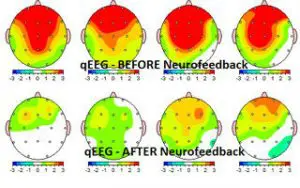When we struggle with depression, sleep, anxiety, ADHD, and OCD, we typically think of traditional talk therapy and/or medications as the first option to consider from the different types of therapies offered for mental health.
Mental health struggles affect millions across the world each year, and individuals struggling with attention, fatigue, low motivation, and blue moods often turn to therapy and medications to support their mental health. CBT, DBT, Behavioral Therapy, Exposure and Response Prevention Therapy, and psychopharmacology are frequently recommended for a myriad of cognitive, emotional, and behavioral challenges.
Therapy is a long-standing and effective tool for many, even though it is a longer treatment process. Medication is a quicker intervention that can reduce symptoms and enhance performance, and is frequently an immediate recommendation. However, with so many concerns about medications and their side effects, and with so many struggling with treatment-resistant symptoms, the need for effective non-pharmacological treatments is vital.
Now, newer, evidence-based, safe, nonpharmacological, and non-invasive interventions exist. These can also be highly effective for mental health and wellness and should be considered as treatment options.
In this post, I will discuss one of these alternative interventions, neurofeedback therapy. While the FDA has approved 19-sensor EEG neurofeedback for anxiety, depression, ADHD, OCD, and poor sleep — all of which negatively impact our performance in schools, colleges, at work, and at home — many do not even consider EEG neurofeedback or know that it is a highly effective treatment option.

What Is Neurofeedback Therapy?
Neurofeedback Therapy is a non-drug, reward-based training system for your brain. The brain functions at its best when healthy, fast and slow-moving EEG brainwave activity occurs. Neurofeedback, a form of biofeedback, optimizes the electrical activity of your brain to stimulate healthy brain activity. It’s a non-invasive treatment that improves unwanted symptoms and behaviors and can be safely utilized with children, adolescents, and adults.
Neurofeedback training reinforces optimal brain functioning, enhancing your brain waves to operate at optimal levels of efficiency. The intervention is simply brainwave biofeedback. One can think of neurofeedback as internally generated physical training for your brain that leads to long-term improvement.
It’s similar to learning to balance on your bicycle. Once your brain learns how to function optimally, you are highly unlikely to forget it. Neurofeedback can be safer than drugs and it can also lead to long-term improvement because neurofeedback uses a learning process that strengthens the synaptic connections in the brain.
How Neurofeedback Therapy for Depression Works
During neurofeedback treatment, there are no invasive interventions — your brain is not stimulated and drugs are not administered. Neurofeedback training only requires wearing a cap with sensors on your head that display your EEG on a computer screen for the clinician. However, as you watch a display, a movie, or a game on your screen, the changes in the screen provide feedback to your brain, and over time train your EEG to more optimal functioning, just like biofeedback.
Additionally, the newer 19 sensor S-Loretta system allows the clinician to obtain your unique EEG patterns in key locations of your brain that provide a brain map with specific training codes for your brain training. This enhances the neurofeedback effectiveness, as the EEG training is targeted to your unique deviant higher or slower frequency brainwaves to bring them to optimal and typical functioning.
Final Thoughts
As mentioned earlier, we often turn to therapy and medications for the treatment of depression, anxiety, ADHD, OCD, and sleep. Despite the time needed for therapy and the side effects of medications, we often don’t consider how neurobiology could play a significant role in maintaining symptoms.
Neurofeedback therapy is an effective, FDA-approved, safe, non-invasive, and non-pharmacological intervention that should be considered as a type of therapy for mental health struggles, in addition to therapy and medications. Science and technology have made great strides in enhancing wellness and performance, and we should continue to explore neurofeedback as a learning process that can reduce symptoms and lead to long-term improvement in mental health and wellness.
If you or one of your loved ones is struggling with depression, ADHD, OCD, anxiety, migraines, sleep, or other conditions, reach out to us. Aspiring Families is proud to offer LORETA Z score 19 channel neurofeedback therapy as an alternative treatment for depression, anxiety, ADHD, and other mental health challenges.
